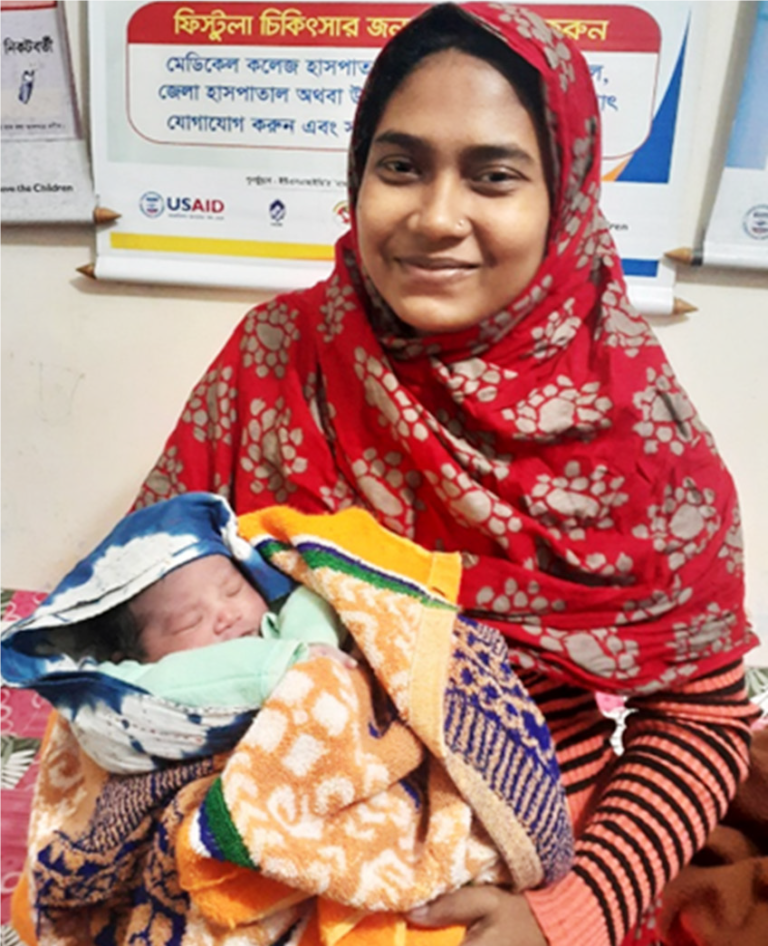This story was originally written by USAID’s MaMoni Maternal and Newborn Care Strengthening Project.
Sraboni Rani Majumder is a Family Welfare Visitor (FWV) in a Madaripur District, Bangladesh Union Health and Family Welfare Center (UH&FWC), which serves a population of around 12,000 people. Since she joined the health center in December 2014, she has been diligently providing antenatal care (ANC) services to expectant mothers. Although motivated, she felt less confident in her competencies in conducting normal vaginal deliveries (NVD) in the facility.
USAID’s MaMoni Maternal and Newborn Care Strengthening Project (MaMoni MNCSP) started working in Madaripur District in November 2018, and after a thorough analysis of the facility and its performance, this UH&FWC was regarded as having high potential. The dedication and willingness of Sraboni as the FWV were deemed to be a great strength for the facility, and to further build upon her skills and competency, the project nominated her for a six-month midwifery skill development training. Sraboni attended this project-funded training from August 2019 to February 2020, and after its successful completion, she was confident and determined to start NVD service in her own facility.
Sraboni’s journey was not very easy at the beginning, with only 3-5 deliveries conducted per month. This was mainly due to most people not being aware that NVD service was available at this facility, and also influenced by the prevailing tradition of giving birth at home. But Sraboni was persistent in her counseling of mothers and encouraging them to deliver at the facility. She tracked down mothers with the closest estimated date of delivery and kept in contact with them through phone calls. The labor room was also standardized with necessary equipment and logistical support by MaMoni MNCSP in the meantime. With her relentless advocacy and promotion, Sraboni finally saw the results of her hard work, as the number of NVDs, along with ANC and postnatal care, started to increase over the years. The number of NVDs increased from 66 to 149 between 2019 and 2021.
A patient of Sraboni’s, Tanjila Begum said, “when I was eight months pregnant, a village Traditional Birth Attendant started talking to my mother-in-law about delivering at home. While receiving ANC from Sraboni apa, I came to know about the delivery service here at the facility. She counseled me on the benefits of delivering with professional help at the facility in comparison to birth at home. She also called me several times over the phone before the delivery date to encourage me. Her efforts gave me the courage to finally convince my family to deliver the baby at the UH&FWC. By the grace of Allah, I have given birth to a baby girl. I am very grateful to FWV apa for providing such good care and keeping both me and my baby healthy. Receiving this great service at free of cost is a blessing for the needy like us.”
“I felt so proud when I held in my hand the first baby that I helped deliver, and the satisfaction keeps growing as I see smiling mothers with their healthy babies,” said Sraboni. “My goal to start NVD service at [this] UH&FWC will not have been possible without the midwifery training facilitated by MaMoni MNCSP and all the support for the labor room readiness. I believe my journey has only started and dedicate myself to providing maternity services to all mothers of this union.”
